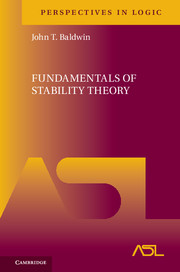Part B - Dependence and Prime Models
Published online by Cambridge University Press: 31 March 2017
Summary
In this part of the book we focus on ways to ‘generate’ a model of a theory. Of course, the most natural notion of generation is closure under functions. However, we are interested in constructing elementary submodels and it is easy to see that the addition of Skolem functions destroys many model theoretic properties including, in particular, the stability hierarchy. For example, there exist ω-stable theories with no complete ω-stable Skolemization. Thus we turn to more general notions. One such idea is known to model theorists as the ‘algebraic closure’ of a set A; it consists of those points which lie in finite sets defined by formulas with parameters from A. Except in the extreme case of a strongly minimal set, this notion lacks the exchange (symmetry) property of a good dependence relation. A next attempt is to adjoin those points which realize a principal type over A. Here too, the full symmetry property is lacking but a reasonable substitute (cf. Section IX.3) holds. However, the requirement that every set have a closure with respect to this relation which is a model of T is extremely strong. In fact, the only known nontrivial sufficient condition for every set to have a closure with respect to this relation is the assumption that the theory is countable and ω-stable. It is necessary to consider some further variants in order to find a notion of closure which is both strong enough to be useful and which applies to a wide class of theories. In this part of the book we give a general treatment of several such properties.
- Type
- Chapter
- Information
- Fundamentals of Stability Theory , pp. 185 - 186Publisher: Cambridge University PressPrint publication year: 2017



